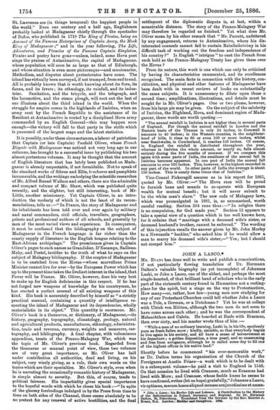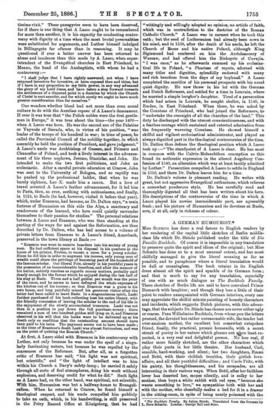JOHN A LASCO.* Mn. EVANS has done well to write
and publish a conscientious, if not particularly flowing translation of Dr. Hermann Dalton's valuable biography (as yet incomplete) of Johannes Laski, or John a Lasco, one of the ablest, and perhaps the most single-hearted, of that brilliant band of scholars who in the early part of the sixteenth century found in Humanism not a resting- place for the spirit, but a stage on the way to Protestantism. How many—or, rather, how few—young men now studying for any of our Protestant Churches could tell whether John a Lasco was a Pole, a German, or a Dutchman ? Yet he was at college with Ulrich von Mitten, although the two men do not seem to have come across each other ; and he was the correspondent of Melanchthon and Calvin. He boarded at Basle with Erasmus, then over sixty, and his master wrote thus of him :—
" While a man of no ordinary learning, Laski is, in his life, spotlessly pure as fresh-fallen snow ; kindly, amiable, so that everybody begins to live again in his society, and all have a sense of bereavement at his departure; a golden disposition, a true pearl, and so unassuming and free from arrogance, although he is called some day to fill OW of the highest offices in his native land."
Shortly before he commenced "his ever-memorable work," as Dr. Dalton terms his organisation of the Church of the Foreigners at Austin Friars—a work which is to be dealt with in a subsequent volume—he paid a visit to England in 1548. On that occasion he lived. with Cranmer, much as Erasmus had lived with More ; and Cranmer, whose feeble knees he seems to have confirmed,writes (let us hope) gratefully," Johannes a Lama, vir optimus, mecum hosce aliquod menses conjunctissime et aman-
• John a Lasco: his Earlier Life and Labours. A Contribution to the History of the Reformation in Poland, Germany, and England. By Dr. Hermann Dalton, Bt. Petersburg. Translated from the German by the Rev. Maurice J. Evans, B.A. London ; Hodder and Stoughton. 1S86.
tissime vixit." These panegyrics seem to have been deserved, for if there is one thing that A Lasco ought to be remembered for more than another, it is his capacity for conducting contro- versy with dignity at a time when the most brutal personalities were substituted for arguments, and Luther himself indulged in Billingsgate far oftener than in reasoning. It may be questioned if ever a better answer has been returned to abase and insolence than this made by A Lasco, when super- intendent of the Evangelical churches in East Friesland, to Menno, the head of the Anabaptists, with whom he had a controversy :—
"I shall judge that I have rightly answered, not when I have returned invective for invective, or have exposed thee and thine, but if I have in any proportion to my little power, in any way advanced the glory of my Lord Jesus, and have taken a step forward towards the settlement of a disputed point in a doctrine by which the Church of Christ is rent asunder, and for which surely we ought to have much greater consideration than for ourselves."
One wonders whether blood had not more than even moral culture to do with the Aurelian repose of A Lasco's demeanour. If ever it was true that "the Polish nobles were the first gentle- men in Europe," it was true about the time—the year 1499— when A Lasco was born. He was the second son of the Palatine or Vayvode of Sieradz, who, in virtue of his position, "was leader of the troops of his hundred in war ; in time of peace, he called the Provincial Council of the nobility together, in which assembly he held the position of President, and gave judgment." A Lasco's uncle was Archbishop of Gnesen, and Primate and Chancellor of Poland, and took a lively interest in the advance- ment of his three nephews, Jerome, Stanislas, and John. He intended to make the two first politicians, and John an ecclesiastic. After a careful private education at Cracow, John was sent to the University of Bologna, and so rapidly was he pushed up the professional ladder, that when he was barely eighteen, Leo X. made him a canon. But a love of travel arrested A Lasco's further advancement, for it led him to Paris, then, as ever, seething with enthusiasms, and finally, in 1524, to Basle (he bad, however, visited it before that year), which, under Erasmus, had become, as Dr. Dalton says, "a main, fortress of Humanism on this side the Alps, a sanctuary and rendezvous of the learned, who here could quietly surrender themselves to their passion for studies." The personal relations between A Lasco and Erasmus, who was then standing at the parting of the ways for and against the Reformation, are thus described by Dr. Dalton, who has had access to a volume of private letters from Erasmus to A Lasco's friend, Amerbach, preserved in the town library at Basle :—
"Erasmus was wont to receive boarders into his society of young men. He had sufficient space at his disposal in his quarters at the house of his printer, Froben, to vacate a room for a young scholar. Since he did this in order to augment his inoome, only young men of wealth could share the privilege of becoming part of the household of the famous scholar. Our liberal Pole, already in his youthful years in the possession of no inconsiderable benefices, and after the manner of his nation, entirely careless as regards money matters, probably paid dearly enough for the favour which he enjoyed daring the last half of his stay at Basle. Three and a half gulden per month was the price of the roam, and he seems to have defrayed the whole expenses of the kitchen out of his income ; so that Erasmus was a guest in his own house' and long painfully missed his generous visitor after the latter had been called to leave Basle. In a magnanimous spirit, Laski further purchased of his book-collecting host his entire library, with the friendly concession of leaving the scholar to the end of his life in the enjoyment of the slowly accumulated treasures. Laski was not then in a position to pay down the full purchase-money; there remained a sum of two hundred gulden still lying on it, and Erasmus observed in his will that the books were to be delivered up at his death only on condition that the outstanding amount should have been paid to his heirs. The payment seems not to have been made ; at the time of Erasmus's death Laski was almost fortuneless, and was on the point of quitting the Romish Church."
At first, A Lasco sided with Erasmus in his controversy with Luther, not only because he was under the spell of a singu- larly fascinating nature, but because he was repelled by the coarseness of the Reformer. But, after all, as a forgotten critic of Erasmus has said, "his light was not spiritual, but scientific," and "the light of intellect was to him within his Church a Davy's safety-lamp ; he carried it safely through all sorts of foul atmospheres, doing his work without explosions, and deserving credit for what he did." Such light as A Lasco had, on the other hand, was spiritual, not scientific. With him, Humanism was but a halfway-house to Evangeli- calism. When he returned to Cracow, he found himself a theological suspect, and his uncle compelled him publicly to take an oath, which, in his handwriting, is still preserved in the Privy Record Office at Konigsberg, that he had "wittingly and willingly adopted no opinion, no article of faith, which was in contradiction to the doctrine of the Roman Catholic Church." A Lasco was in earnest when he took this oath ; but the seed of Lutheranism had already been sown in his mind, and in 1538, after the death of his uncle, he left the Church of Rome and his native Poland, although King Sigismund had conferred on him the Archdeaconry of Warsaw, and had offered him the Bishopric of Cuvajia. "I was once," as he afterwards summed up his ecclesias- tical life in Poland, "a Pharisee of repute, adorned with many titles and dignities, splendidly endowed with many and rich benefices from the days of my boyhood." A Lasco completed the sacrifice of his personal prospects with his usual quiet dignity. He now threw in his lot with the German and Dutch Reformers, and settled for a time in Louvain, where he married a simple burgher's daughter. Tired of a persecution which had arisen in Louvain, he sought shelter, in 1540, in Emden, in East Friesland. When there, he was asked by the Countess of Friesland, who had joined the Reformers, to "undertake the oversight of all the churches of the land." This duty he discharged with the utmost conscientiousness, and with a fearless courage which sustained and extorted admiration from the frequently wavering Countess. He showed himself a skilful and vigilant ecclesiastical administrator, and played an always dignified part in the theological controversies of the time. Dr. Dalton thus defines the theological position which A Lasco took up :—" The standpoint of A Lasco is clear. He has most in common with the Calvitt.Melanchthon conception as this found its authentic expression in the altered Augsburg Con- fession of 1540, an alteration which was at least tacitly admitted by Luther." Persecution compelled A Lasco to settle in England in 1550, and there Dr. Dalton leaves him for a time.
Dr. Dalton's volume is pleasant reading. He writes with great, but not aggressive Evangelical enthusiasm, which relieves a somewhat ponderous style. He has carefully read and thoroughly digested all that has been written about his hero. His descriptions of the controversies of the time in which A Lasco played his nowise inconsiderable part, are agreeably fresh ; and his picture of Humanism and its devotees at Basle, errs, if at all, only in richness of colour.



































 Previous page
Previous page